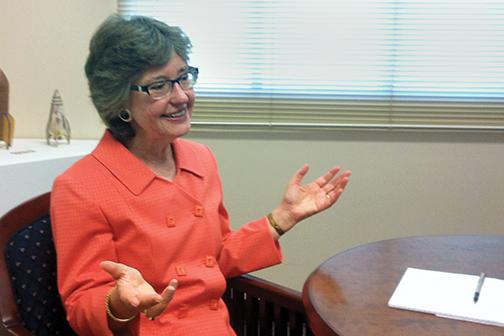During summer break, the faculty and staff of San Diego State received an email from SDSU Provost Nancy Marlin revealing her decision to step down. Marlin has held the title since 1998, when she was chosen as SDSU’s first woman provost.
Marlin said few people know what a provost is. To corporate people, she says she is the vice president and to military people, she says she is second-in-command. But really, the provost is the chief academic officer of the university. All facets of the university related to academics report to her, including faculty departments, colleges, enrollment services, the Imperial Valley campuses and extended studies, among other areas of SDSU.
“It’s a very large responsibility,” she said.
This academic year will be Marlin’s last as provost, but she is not retiring. She’s stepping down to a faculty role, which she hopes will focus on international issues. As provost, Marlin urged for the extensive growth of study abroad programs.
“I always remember when I interviewed for this job, I asked the basic question ‘How many students are studying abroad?’ People would just look at one another like ‘Well, we don’t know,’” Marlin said. “I came in knowing this is essential for a quality education.”
Marlin said she is stepping down because she needs more free time.
“I love the job and I love the university, but this is a 24/7 job, and at some point you get to think, ‘I’d like to do something else other than work every moment I’m awake,’” Marlin said. “I’ve done this a really long time.”
Marlin said the average term for provosts at research universities is 4.2 years; however, she’s been provost for 15 years. She had been contemplating stepping down for a while, but she said she wanted to wait until the university recovered from budget cuts and the temporary freeze of new faculty hires.
“We are going back up now, finally going to start rebuilding,” Marlin said. “Come here and cut budget? That wasn’t going to attract high-quality people.”
For the incoming provost, Marlin hopes the committee will pick a candidate with a strong academic and administrative background who can deal with million-dollar budgets—one which grew during her administration, but then sunk after the economic crisis—and who has great respect and value for what faculty do.
Marlin’s administration revived the tenure track and tenured promotions for faculty, political science professor emeritus Edward Heck said. Heck was promoted tenure in 1987, and 14 years later—three years after Marlin became provost—the next person was promoted in his department. During Marlin’s administration, 12 more tenure promotions have been made in political science.
“There was a period when we didn’t emphasize tenure-track hiring,” Heck, who is retiring this year, said. “Frankly, I’m glad that I won’t have to deal with the new provost because the one we have now, from the faculty perspective, has done an outstanding job. I would say she’s a faculty member’s ideal provost.”
Marlin will step down at the end of the spring 2014 semester.










